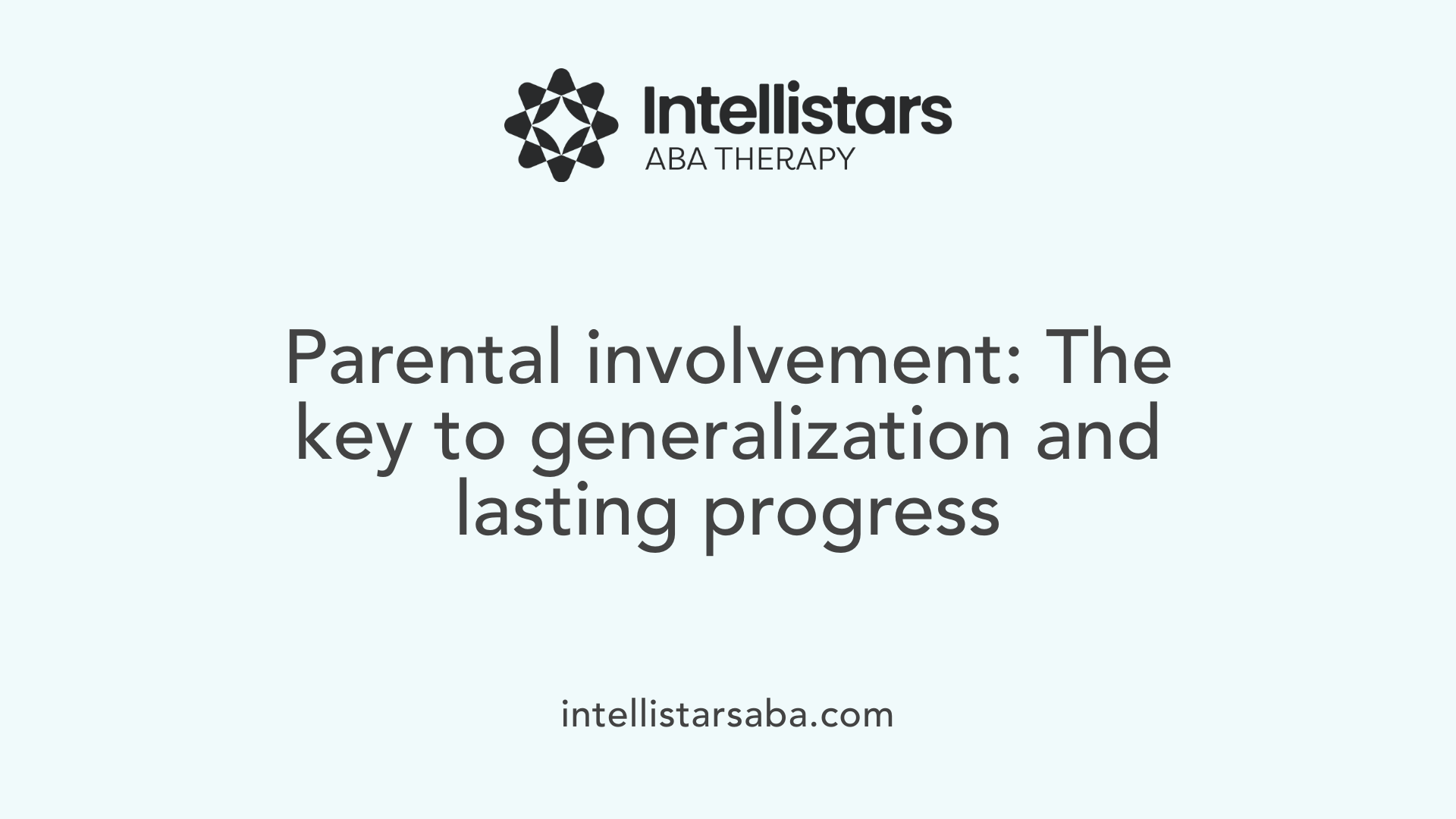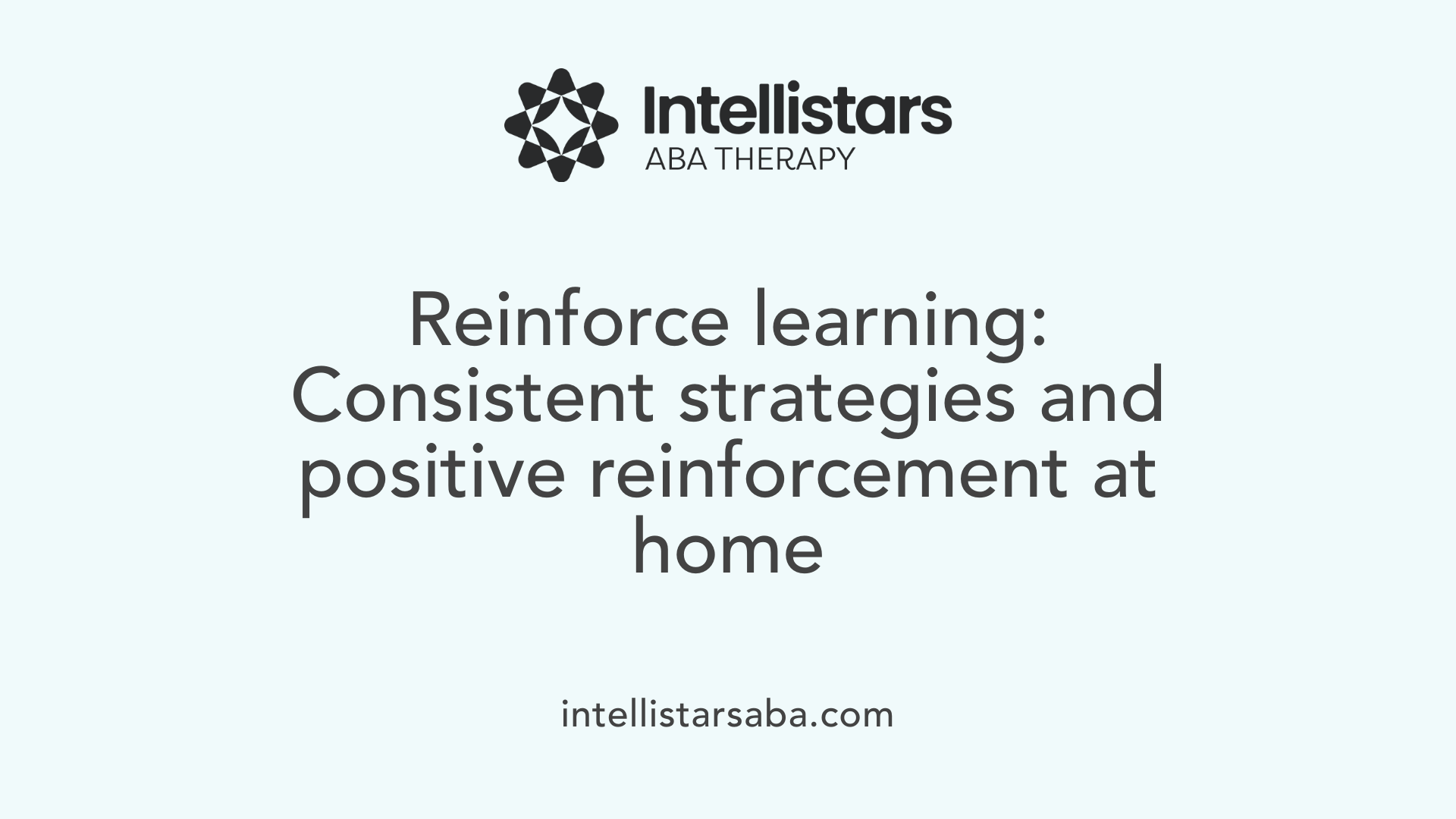Understanding the Critical Role of Parents in Home-Based ABA Therapy
Parental involvement is a cornerstone of effective ABA therapy for children with autism. When parents actively participate and collaborate with therapists, they significantly enhance the child's chances of making meaningful, lasting progress. This article explores why parental engagement is vital, the benefits it provides, effective strategies for participation, and how parents can overcome challenges to maximize their child's development.
The Importance of Parental Involvement in ABA Therapy

What is the importance of parental involvement in home-based ABA therapy?
Parental involvement plays a crucial role in the success of ABA therapy, especially when conducted in the home. It ensures that the strategies and skills learned during therapy sessions are consistently reinforced in everyday life. When parents actively participate, behaviors targeted during sessions are more likely to generalize across different environments, leading to lasting improvements.
Parents who understand and apply ABA techniques, such as positive reinforcement and prompting, strengthen their child's learning process. Training parents in these methods not only boosts their confidence but also creates a supportive, motivating environment conducive to growth.
Effective collaboration between parents and therapists allows the developmental goals to be tailored to the child's specific needs. Regular communication and feedback help adjust strategies and keep everyone aligned.
Furthermore, family involvement provides emotional support, which is vital for reducing parental stress and fostering a positive atmosphere for the child. When parents witness progress and are equipped with the necessary skills, they feel empowered and more committed to their child's progress.
In summary, parental participation enriches therapy outcomes by ensuring consistency, facilitating skill generalization, and strengthening the emotional bond, making it an indispensable part of successful ABA intervention.
Benefits of Active Parental Engagement
What are the benefits of active parental engagement in home-based ABA therapy?
Active involvement of parents in ABA therapy offers numerous positive effects that can significantly enhance a child's progress. One major benefit is the ability to promote skills generalization across different environments. When parents are trained and consistently apply ABA techniques at home, children learn to carry over behaviors from therapy sessions into daily life, helping them become more adaptable.
Another advantage is the acceleration of progress and increased independence. Children tend to improve faster when intervention strategies are reinforced consistently both in therapy and at home. This reinforcement not only speeds up learning but also encourages children to become more self-reliant.
Parental participation also provides emotional and psychological support, creating a nurturing environment where children feel secure and motivated. This emotional backing boosts their confidence and reduces anxiety, which can positively influence their willingness to learn.
Moreover, tailored intervention strategies that fit seamlessly into family routines are more sustainable. When parents incorporate therapy into everyday activities, it becomes a natural part of life, making it easier to maintain progress over time.
Regular collaboration and training empower parents, turning them into active partners in their child's development. Overall, sustained parental engagement maximizes therapy outcomes, fosters stronger bonds, and supports the child's long-term growth.
Effective Strategies for Parental Participation
What strategies can parents use to effectively participate in ABA therapy?
Parents play a vital role in the success of ABA therapy for children with autism. To maximize their involvement, they can adopt several practical strategies.
First, participating in parent training sessions is essential. These sessions teach parents ABA techniques such as prompting, reinforcement, and behavior analysis, equipping them with the skills needed to support their child's progress consistently.
Open communication with therapy providers fosters a collaborative relationship. Regular updates, questions, and feedback sessions ensure that therapy strategies are tailored to the child's evolving needs. By understanding the goals and methods, parents can better reinforce skills at home.
Observing therapy sessions and engaging in hands-on coaching offers invaluable insights. Watching professionals in action allows parents to learn specific techniques and understand how to implement them effectively during daily routines.
Consistency is crucial. Applying learned strategies at home, such as positive reinforcement and structured routines, helps generalize skills across settings. Simple practices like rewarding compliance and practicing communication skills strengthen progress.
Cultural considerations and daily routines should be integrated into therapy plans. Respecting family customs and schedules makes interventions more applicable and sustainable, creating a supportive environment that enhances learning.
Monitoring progress through visual data, attendance at training, and staying connected with therapists empower parents. This active involvement encourages a team approach, making therapy more effective and emotionally rewarding.
Finally, ongoing emotional support and patience are vital. Recognizing that progress takes time and celebrating small victories foster a positive atmosphere that benefits both the child and the family.
In summary, effective parental participation involves training, communication, observation, consistent practice, and adapting strategies to fit family routines and cultural contexts. These efforts contribute greatly to meaningful, lasting improvements in children’s development.
Supporting Child Progress: Practical Steps for Parents
How can parents support their child's progress in ABA therapy?
Parents play a vital role in reinforcing and extending the skills learned during ABA therapy sessions at home. One of the most effective ways they can support their child's development is by actively participating in the application of therapy strategies. This includes using visual supports, establishing consistent routines, and providing positive reinforcement like praise or rewards to encourage desired behaviors.
Participating in sessions or observing them helps parents better understand the techniques used by therapists, such as prompting and behavior analysis. This knowledge enables parents to replicate strategies, foster skill mastery, and promote consistency across different environments. Open communication with the ABA team is also crucial; regular updates and feedback help tailor interventions to the child's evolving needs.
Creating a structured and supportive environment is essential. Simplifying routines, preparing necessary resources, and minimizing distractions can make therapy sessions more effective. Celebrating small milestones and exercising patience foster motivation and resilience. Involving themselves in parent training programs, collaborating with therapists, and applying learned techniques at home ensures that progress is maintained and generalized.
In summary, engaging actively with therapy plans, communicating openly with professionals, and applying ABA principles consistently across home life are all ways parents can significantly support their child's ongoing progress.
Reinforcing ABA Strategies at Home

What methods can parents use to reinforce ABA strategies at home?
Parents play a vital role in translating therapy gains into everyday life. One of the most effective ways they can support their child's progress is through consistent practice of skills learned during ABA sessions. For example, encouraging a child to ask for an item or take turns during play can reinforce social and communication skills.
Positive reinforcement is foundational in ABA. Parents are advised to use praises, tokens, or small rewards to motivate and strengthen desirable behaviors. Celebrating successes, no matter how small, helps boost the child's confidence and encourages continued effort.
Structure and predictability help children feel secure and promote learning. Using visual supports like schedules or picture charts can provide clear expectations and routines. This visual structure helps children understand what comes next and reduces anxiety related to uncertainty.
Maintaining open lines of communication with the ABA therapy team is essential. Regular discussions enable parents to ask questions, share observations, and receive tailored guidance. Participating in caregiver training sessions further empowers parents with techniques for effective reinforcement at home.
In summary, incorporating consistent practice, positive reinforcement, visual supports, and ongoing professional collaboration creates a supportive environment that fosters meaningful, lasting progress. These strategies help children generalize skills across settings and build confidence in their abilities.
Collaborating Effectively with Therapy Professionals

How can parents collaborate with therapists to enhance their child's ABA therapy?
Effective collaboration between parents and therapists plays a vital role in the success of ABA therapy for children with autism. Open communication channels are fundamental; parents should regularly share observations about their child's behavior at home, provide feedback on what strategies seem to work, and discuss any concerns or questions they might have.
Active participation during scheduled check-ins and therapy sessions helps parents understand intervention techniques, enabling them to reinforce learned skills consistently. Attending therapy sessions when possible allows parents to observe strategies in action, ask questions, and gain confidence in applying techniques at home.
Parents are encouraged to seek training and guidance from therapists on specific methods such as prompting, reinforcement, and behavior analysis. This knowledge equips them to create a supportive environment that promotes skill generalization.
Involving parents in goal-setting and regular review meetings ensures that therapy objectives remain aligned with the child's evolving needs and the family's routines. This collaborative approach fosters shared responsibility and commitment.
Building a trust-based relationship with therapy professionals encourages openness and transparency. When families feel respected and supported, they are more likely to engage actively and address challenges proactively.
In summary, by maintaining honest communication, participating in goal development, sharing insights, and cultivating a respectful partnership, parents and therapists can work together to maximize the effectiveness of ABA therapy. This teamwork not only accelerates the child's progress but also strengthens the emotional bond within the family.
Fostering Emotional and Environmental Support
 Providing emotional reassurance and encouragement is vital for maximizing therapy outcomes in children receiving ABA intervention. Parents who offer consistent praise, patience, and emotional support create a positive and trusting atmosphere that can significantly boost a child's confidence and willingness to participate.
Providing emotional reassurance and encouragement is vital for maximizing therapy outcomes in children receiving ABA intervention. Parents who offer consistent praise, patience, and emotional support create a positive and trusting atmosphere that can significantly boost a child's confidence and willingness to participate.
Patience and managing expectations are crucial, as developmental progress can vary greatly between children. Recognizing that improvement takes time helps parents maintain a calm attitude and stay motivated, reducing frustration that might hinder continued effort.
Creating a supportive home environment is another essential aspect. This involves preparing necessary resources, establishing routines, and ensuring the setting is conducive to therapy activities. A well-structured environment minimizes distractions, allowing children to focus on learning new skills.
Minimizing distractions is particularly important for maintaining engagement during in-home sessions. Parents can reduce noise, secure devices, and set clear boundaries to help the child concentrate. This controlled environment reinforces the skills learned during therapy and encourages consistent application across settings.
By adopting a nurturing posture, celebrating small successes, and maintaining a consistent routine, parents can foster an environment that supports their child's ongoing development. Such emotional and environmental support not only reinforces learned behaviors but also strengthens the emotional bonds between parent and child, which is fundamental for effective therapy.
For further insights on how to provide emotional support at home, searching for "emotional support in home-based ABA" offers practical strategies and resources.
Conclusion: The Path to Successful Home-Based ABA with Parental Involvement
 Parental involvement in ABA therapy is essential for maximizing positive outcomes for children with autism. As research demonstrates, when parents actively engage in their child's intervention—through training, consistent application of strategies, and open communication—the benefits extend beyond the clinical setting. This partnership leads to better generalization of skills into everyday environments, accelerates developmental progress, and strengthens emotional bonds between parents and children.
Parental involvement in ABA therapy is essential for maximizing positive outcomes for children with autism. As research demonstrates, when parents actively engage in their child's intervention—through training, consistent application of strategies, and open communication—the benefits extend beyond the clinical setting. This partnership leads to better generalization of skills into everyday environments, accelerates developmental progress, and strengthens emotional bonds between parents and children.
A collaborative approach between families and professionals fosters a team dynamic built on shared goals and mutual understanding. Educating parents about techniques such as positive reinforcement and behavior analysis enables them to reinforce learning and sustain progress at home. Regular observation, feedback, and participation in therapy sessions empower parents and help tailor interventions to each child's unique needs.
The long-term advantages of such active parental involvement include enhanced skill maintenance, improved family well-being, and reduced parental stress. When parents stay engaged, they create a consistent and supportive environment that encourages continuous growth. Over time, this collaborative effort contributes to meaningful, lasting improvements in behavior and development—transforming therapy success into a sustainable journey of progress.
Fostering Lasting Growth and Development Through Parental Engagement
Involving parents directly in home-based ABA therapy is not just beneficial but essential. Their involvement ensures consistent application of therapy strategies, reinforces skills learned, and helps children generalize and maintain behaviors across different environments. Effective collaboration with therapists, ongoing communication, and a nurturing, structured environment collectively contribute to stronger outcomes. As parents become active team members, they foster a positive, resilient foundation for their child's long-term developmental success. The dedication, patience, and active participation of families are pivotal in transforming therapy from a clinical intervention into a comprehensive, life-enhancing process.
References
- The Role of Caregiver Involvement in ABA Therapy
- The Importance of Parental Involvement in ABA Therapy
- Parental Role in ABA Therapy
- What Do Parents Do During In-Home ABA Therapy?
- Parental Involvement in ABA Therapy for Children with ...
- The Role of Caregiver Involvement in ABA Therapy
- Helping Parents Understand Applied Behavior Analysis
- The Importance of Parental Involvement in ABA Therapy
- What Do Parents Do During In-Home ABA Therapy?






